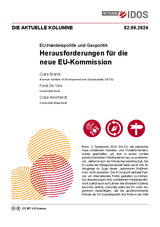The Current Column
EU trade policy and geopolitics
Challenges for the new EU Commission
Brandi, Clara / Ferdi De Ville / Clara WeinhardtThe Current Column (2024)
Bonn: German Institute of Development and Sustainability (IDOS), The Current Column of 2 September 2024
Bonn, 2 September 2024. The EU has created numerous new unilateral trade and investment instruments to reposition itself in an environment of geo-economic competition as the climate crisis accelerates. The EU should not alienate the international community by going alone with these “autonomous measures”. The EU needs partners worldwide to shape international policy. With respect to this, the effects of its unilateral trade policy are central, not least for countries in the Global South. In the future, the EU should pay more attention to how the geo-economic turn in EU trade policy influences its role in the world. This is because the new unilateral instruments exacerbate conflicts of objectives between trade and development policy.
The EU has developed three types of new geo-economic instruments in trade policy: firstly, competition instruments aimed at eliminating market distortions and creating a level playing field for EU companies. Secondly, security instruments that utilise economic measures to achieve security objectives. And thirdly, sustainability instruments that aim to minimise negative environmental effects in connection with trade and investment.
The impact of these trade policy instruments on low-income and middle-income countries varies. Conflicting objectives between geo-economic and development policy goals are more relevant for sustainability-related instruments of EU trade policy than for the other two kinds.
Competition and security instruments often have only a limited impact on developing countries. These instruments rarely provide for flexibility or exceptions for these countries. However, they are primarily aimed at high-income and middle-income countries such as the USA, Japan, Brazil and China. Nonetheless, developing countries can be negatively affected. One example is the International Procurement Instrument (IPI), which restricts access to EU procurement markets for companies from countries that do not take part in liberalisation of their procurement market to a comparable extent to the EU. An exception for the least developed countries was explicitly integrated into the instrument so as not to penalise suppliers from these countries. However, larger developing countries were not excluded.
Sustainability-related instruments, on the other hand, can often have a substantial negative impact on developing countries. They often focus on high-risk products or countries – and frequently target developing countries in particular. From the end of 2024, for example, extensive due diligence obligations must be met for deforestation-free supply chains for raw materials such as wood, cocoa and coffee. These requirements primarily affect countries in the “Global South”. For the EU’s sustainability policy to be effective, it is seen to be necessary that developing countries are not granted any flexibility. Compensation in the form of financial or technical support is not envisaged as part of the instruments. Developing countries also criticise the fact that they were not consulted in advance during the development of the new instruments.
What conclusions can be drawn from this? Firstly, policy coherence for development appears to be becoming less important for the EU. This makes the EU less and less attractive as a partner for the countries of the Global South, especially in view of the constantly growing competition from major players such as China. Secondly, geo-economic competition makes it difficult to reconcile the various objectives of EU foreign policy. The EU used to be able to present trade liberalisation as a panacea that would promote global prosperity, peace and sustainability. The new geo-economic paradigm recognises that the liberalisation of trade and investment is associated with significant risks and negative externalities in the areas of development, environment and security.
In the future, the EU should ensure that trade policy measures to mitigate climate change or biodiversity loss are not taken at the expense of developing countries. If compensation or offsetting is not integrated into the relevant trade policy instruments themselves, the EU should offer increased support through other channels. Important starting points include the EU-Africa Green Energy Initiative, the Global Gateway and bilateral initiatives and financing instruments. The new EU Commission therefore has a long to-do list.
Prof. Dr. Clara Brandi is Head of Research programme “Transformation of Economic and Social Systems”.
Ferdi De Ville is Associate Professor in European political economy at the Department of Political Science of Ghent University.
Clara Weinhardt, PhD is Assistant Professor in International Relations at Maastricht University.


